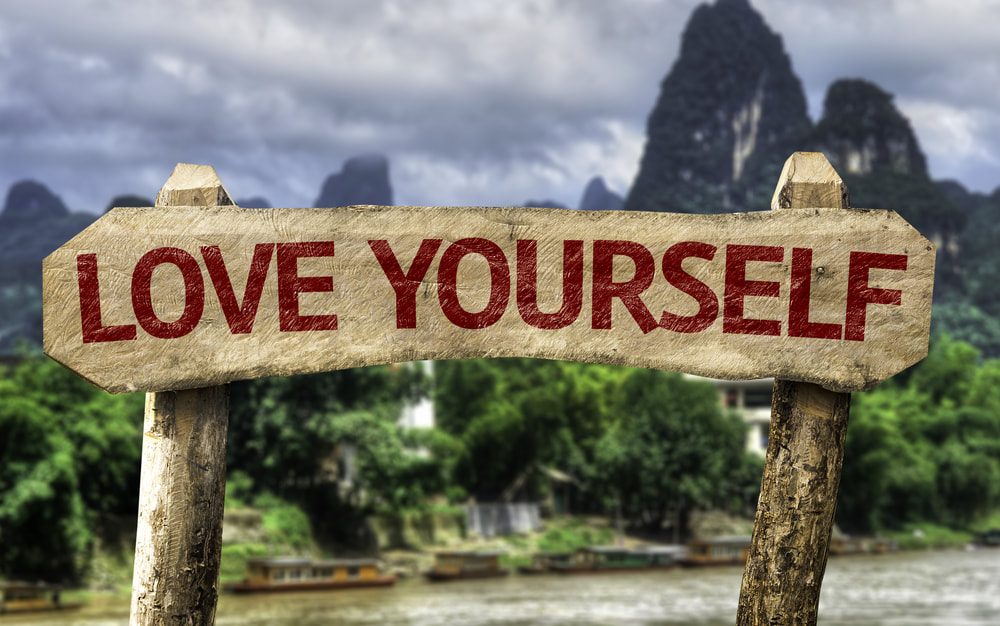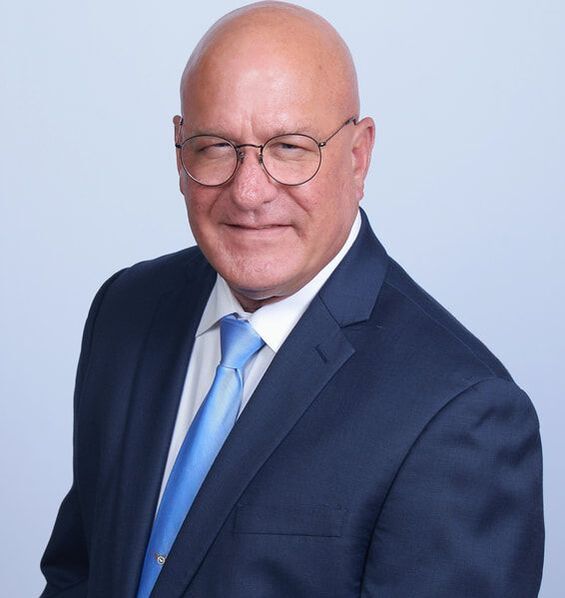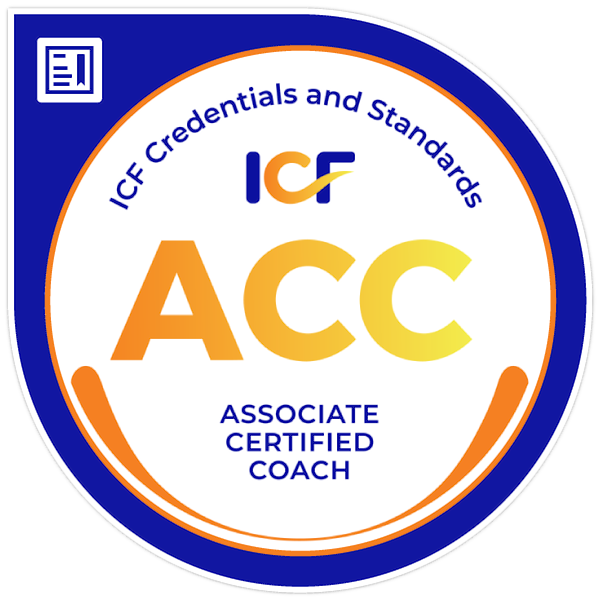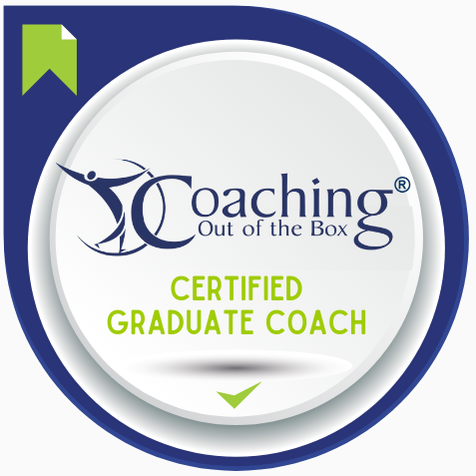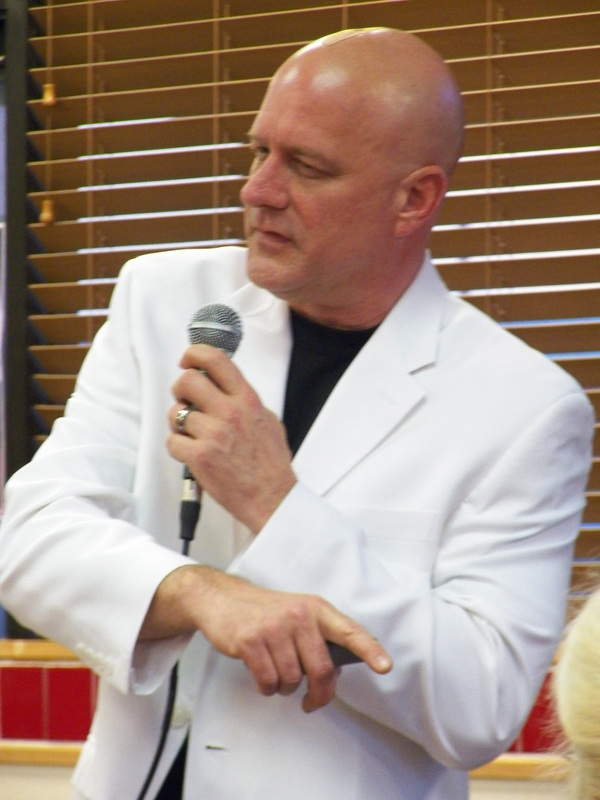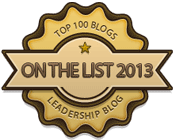|
Some version of the title of today's blog—known as The Great Commandment—appears in the Christian Bible nine times (my search was done on Bible Gateway using the Amplified Bible). It appears twice in Leviticus and the Gospel of Matthew and once in the Gospels of Mark and Luke and in Romans, Galatians, and James. The second time it appears in Leviticus the love we should have refers to "the stranger who resides with you." This profound saying is familiar to Christians and non-Christians alike. There are two sides to this profound idea. First, we are to love our neighbors and strangers. As a species, we are connected as neighbors and strangers like never before in recorded history. From the geopolitical to the boardroom, from the C-suite to the front-line, from statehouses to our federal government, and in our schools, churches, shops, and on and on—it seems we could live and work with a bit more love, compassion, understanding, basic respect, non-violence, and empathy, like never before. It's the other side of this proverbial saying that has always been so powerful for me and it's the side that's easy to overlook or forget. If we are to love our neighbors unconditionally, generously, or compassionately, we will need to love ourselves that way too! This is especially important for leaders today if we are to lead effectively.
ROBERT HOLDEN Success Intelligence What rituals or practices do you engage in on a daily, weekly, or cyclical basis that promote self-care or self-love? Some Ways to Promote Self-Care & Self-Love
Have an amazing journey today! Alan Mikolaj is a coach and leadership development consultant with 15+ years of experience. He is passionate about helping leaders transform their leadership, their teams, and their organizations. Impactful, professional approach driven by a passion for meaning and purpose, a growth mindset, and a commitment to excellence and service in order to drive change and results. Alan maintains the ethics and standards of behavior established by the International Coaching Federation (ICF), including the standards regarding confidentiality. You can learn more about them on the ICF website. Impactful change starts with a conversation! Schedule your free, one-hour session by clicking here: Discovery Conversation with Alan Or call or email me: Contact Page
0 Comments
Social scientists have found that the fastest way to feel happiness is to practice gratitude. CHIP CONLEY 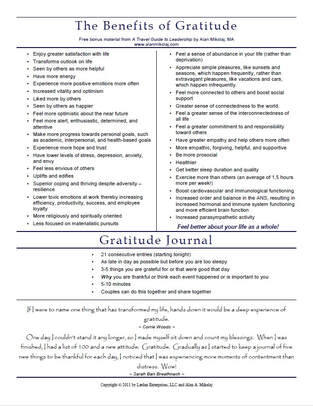 Today, March 20, 2023, is the United Nation's International Day of Happiness. And, this year's theme is: 'Be mindful. Be grateful. Be kind.' Join me by pausing several times today and spending about five minutes boosting yourself and building your compassion for others by following the following three steps from this year's theme: STEP ONE: Be mindful. Take three, slow, full breaths. At full inhalation, pause and hold for a couple of seconds (or what feels comfortable for you) and then slowly exhale. At full exhalation, pause and hold that for a couple of seconds (or what feels comfortable for you). After three breaths, ask yourself, "How do I feel, right now?" STEP TWO: Be grateful. Look around. Look inward. Ask yourself, "What am I grateful for?" STEP THREE: Be kind. With warm feelings, ask yourself, "Who do I want to send love to? Who can I show compassion towards?" Gratitude: The bridge to happiness. Chip points out in our opening quote that the research soundly supports that gratitude is a solid and free way to promote your happiness and wellbeing. For example, Dr. Martin Seligman, the father of positive psychology, and colleagues reported in 2005 on answers they found to the question, “What really works when trying to increase happiness?” (Seligman, Stern, Park, & Peterson, 2005). One of the most powerful interventions that really worked at increasing happiness was practicing a form of a daily gratitude journal that they called the ‘Three Good Things in Life’ intervention. It took about a month for the increases in happiness to become statistically significant, even if done for only one week. So, a little patience in the beginning is necessary. The happiness levels continued to rise after that—all the way out to six months! It absolutely amazes me that something so simple and free can have such a powerful and long-lasting effect on happiness. Download my free The Benefits of Gratitude to learn more ways to practice gratitude, read some quotes about gratitude and happiness, and find some inspiration. You don't have to enter your email. No irritating pop-ups. No junk mail. It's simply my way of expressing gratitude to you for reading my blog. If you want to learn more about the International Day of Happiness, you can visit the official website here: The International Day of Happiness website Have an amazing journey today! Alan Mikolaj is a coach and leadership development consultant with 15+ years of experience. He is passionate about helping leaders transform their leadership, their teams, and their organizations. Impactful, professional approach driven by a passion for meaning and purpose, a growth mindset, and a commitment to excellence and service in order to drive change and results. Alan maintains the ethics and standards of behavior established by the International Coaching Federation (ICF), including the standards regarding confidentiality. You can learn more about them on the ICF website. Everything will work again if you unplug it for a few minutes, including you. ANNE LAMOTT I saw the opening quote from Anne Lamott on LinkedIn and it really resonated with me. It's a great quote today, since this week or next is spring break for a lot of people. It's a great time to unplug and connect to nature and relax. Nature Connectedness Studies show that nature connectedness or NC has many benefits such as improved positive affect, decreased physiological and psychological stress responses, and it helps reduce attentional fatigue, thus improving cognitive functioning. And, it just feels good. What psychologists call hedonic well-being. A recent meta-analysis has discovered something more about nature connectedness. People who are more connected to nature tend to have greater eudaimonic well-being. What's eudaimonic well-being? Eudaimonic Well-being Eudaimonia is a type of well-being that describes a life well-lived or human flourishing. It is an orientation toward growth, authenticity, meaning and excellence. Contrast that with hedonic well-being, or just feeling good—what the psychologists call positive affect. A popular scale for measuring eudaimonic well-being includes the following dimensions or subscales:
The researchers found that that people who are connected to nature are in fact more likely to be flourishing and functioning well psychologically. And they discovered a surprise. The surprise finding. While each subscale was associated with eudaimonic well-being, the personal growth subscale had the largest effect size. This is huge for those of us in the personal and leadership development arenas. This finding raises the possibility that our relationship with nature may have a particularly important role in furthering psychological growth and development. That subscale is specifically concerned with self-realization and is akin to Maslow’s concepts of self-actualization and self-transcendence. The authors say, "The sense of awe felt in nature could lead to an expansion in individuals’ mental structures and frames of reference, as well as an expanded sense of self, and so foster personal growth. This would be consistent with Frederickson’s broaden and build theory of positive emotions." So, while spring break in and of itself may not boost your eudaimonic well-being, getting out in nature this spring break just might be one way to boost yours. Have a great spring break, and... Have an amazing journey today! Alan Mikolaj is a coach and leadership development consultant with 15+ years of experience. He is passionate about helping leaders transform their leadership, their teams, and their organizations. Impactful, professional approach driven by a passion for meaning and purpose, a growth mindset, and a commitment to excellence and service in order to drive change and results.
Alan maintains the ethics and standards of behavior established by the International Coaching Federation (ICF), including the standards regarding confidentiality. You can learn more about them on the ICF website. Everyone is a leader either by choice or default. BRUCE SCHNEIDER We are all leaders
The leadership journey is a special kind of journey. It is interwoven with our life journey. Leaders are in every avenue of life and have many names: captain, coach, counselor, director, doctor, friend, grandparent, group lead, manager, parent, pastor, president, role model, sergeant, spouse, student, supervisor, teacher, volunteer, and on and on. We are all leaders in some role or capacity. As Bruce Schneider, Master Certified Coach, author, and founder of iPEC Coaching wrote in our opening quote(emphasis in the original), “Everyone is a leader either by choice or default. If you don’t think of yourself as a leader, then you’re limited in your thinking. Leading is the way we help move people into action, including ourselves. The question is not whether you are a leader, but how well you lead.” The Journey Our leadership journey and leadership development are integrated into who we are. It is both personal and professional. You cannot have integrity at work and then suddenly not have it at home. You cannot be nurturing at home and then put on a hat of neglect at work—at least not without negative consequences. The leadership journey is analogous to what Abraham Maslow defined as self-actualization; what Leo Buscaglia described as becoming; Wayne Dyer calls the fully-functioning person and your higher self; and, what Robert Holden refers to as authentic success or the Unconditioned Self. It is no coincidence that common themes recur from different traditions, perspectives, and people. Wisdom traditions have reiterated common themes throughout the ages. So whatever name you give it, leadership is about the whole person—not just your work or role or title. Your body, thoughts, emotions, spirit, and relationships working in harmonious synergy help bring you closer to your highest self and affect how you “help move people into action,” including yourself. Each of our journeys are animated and empowered by our own unique gifts, environments, and by those who we meet and accompany us along the way. Growth or Learning Mindset The leadership journey is a never-ending journey. While there may be many milestones along the path, the best leaders are on a continuous road of self-improvement and growth. Therefore, the best leaders have a commitment to becoming—formally, informally, and through analysis of experience. So, as you nurture your whole self, do so with the mindset that what you are experiencing and learning and becoming will impact your leadership. That way, you get to determine how. |
Alan Mikolaj
Alan Mikolaj is a a professional, experienced, positive, and passionate speaker, leadership and organizational development consultant, change agent, author, and coach. He holds his Master of Arts degree in Clinical Psychology from Sam Houston State University. He is a certified graduate coach from Coaching Out of the Box and holds his ACC and membership with the International Coaching Federation (ICF). Free Discovery Conversation!
Impactful change starts with a conversation! Schedule your free, one-hour session by clicking here: Discovery Conversation with Alan
Or call or email: Contact Page In his third book, A Travel Guide to Leadership, Alan offers you simple, fundamental, and powerful lessons that have the power to transform you, your relationships, and your career.
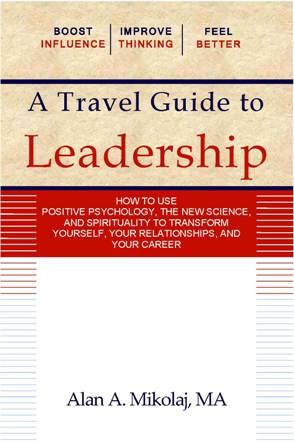
Blog Archives
July 2024
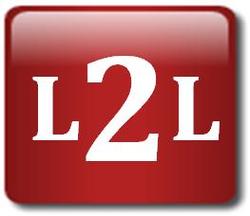
Linked2Leadership
Ranked #1 Business Blog! |
|
CONTACT
TEL: 346-291-0216 EMAIL: [email protected] SCHEDULE TIME WITH ALAN Free Discovery Conversation with Alan |

